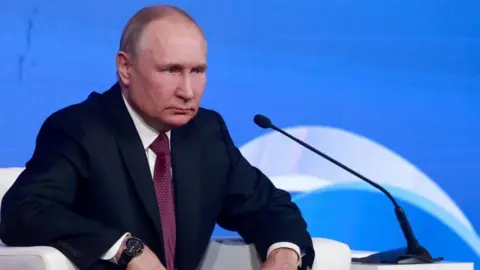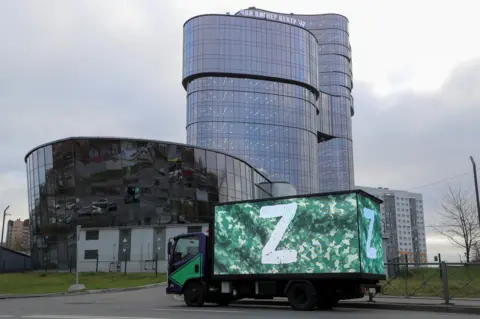Ukraine war: Putin endorses evacuations from occupied Kherson
 Reuters
ReutersRussian President Vladimir Putin has publicly approved the evacuation of civilians from parts of Russian-occupied Kherson in southern Ukraine.
Kyiv's forces have been steadily advancing on the strategic port city.
Mr Putin said people living in dangerous areas should leave as "the civilian population should not suffer".
At least 70,000 people are reported to have been moved already from Kherson - the only major city gained by Moscow since its troops invaded in February.
Civilians at risk from shelling and attacks should be "removed", Mr Putin said, during the Unity Day holiday in Moscow's Red Square.
Kyiv accuses Russia of forcibly deporting Ukrainian civilians - which is considered a war crime - although Moscow denies this.
Russia's intensive missile and drone strikes on civilian infrastructure across Ukraine have caused heavy casualties and damage, and forced Kyiv to impose frequent electricity blackouts.
Mr Putin's comments followed reports on Thursday that Russian soldiers, too, had been leaving Kherson - in what would mark a major withdrawal.
A Kremlin-installed official in the region, Kirill Stremousov, told Russian media that Moscow was "likely" to pull its troops from the area.
Ukrainian officials remained cautious, warning that the reported move could be a trap to lure their soldiers into dangerous areas.
Kherson was captured soon after Russia attacked its neighbour on 24 February, but recently Ukrainian forces have steadily recaptured territory on the city's outskirts.
Civilians were first urged to leave Kherson in the middle of last month, as the Russian army switched the city to defensive mode.
Military commanders later said they had completed an operation to evacuate the city's residents, ahead of an expected battle there.
Russia claims the Kherson region and three other Ukrainian regions as its own territory, though it does not fully control any of them. It hastily arranged local "referendums" to justify the claim - a move condemned internationally.
Russia also annexed Ukraine's Crimea peninsula in 2014.
During Friday's speech in Red Square, Mr Putin also said some 318,000 military recruits had signed up for duty during a mobilisation, now complete - exceeding his target of 300,000.
Of these, Mr Putin said 49,000 were already involved in active fighting - a figure not independently verified by the BBC.
In its latest update, Britain's Ministry of Defence said the latest recruits would make little impact on the conflict as Russia would struggle to train them.
Meanwhile, a Russian private military company, the Wagner Group, has opened its first official headquarters, in St Petersburg.
Its fighters are reported to be active in the Russian campaign in Ukraine, and it has recruited prisoners to fight there, in exchange for their sentences being commuted in Russia.
 Reuters
ReutersWagner soldiers have repeatedly been accused of human rights violations, including in Syria, Libya and other conflicts.
Mr Putin has now amended the Russian law on calling up reservists to include men convicted of serious crimes who recently left prison.
The change means that convicted murderers and drug dealers who have recently been released could be conscripted to fight in Ukraine.
Former prisoners convicted of sex crimes against children or terrorism are still excluded from serving.
In his latest comments on the war, Ukrainian President Volodymyr Zelensky attacked the "absolutely insane stubbornness of the owners of today's Russia".
He said his enemy was uninterested in peace talks, but was instead sending "people to the meat grinder" - both mobilised troops and mercenary fighters.
Referring to the week's "fiercest fighting", Mr Zelensky singled out the eastern towns of Bakhmut and Soledar.


